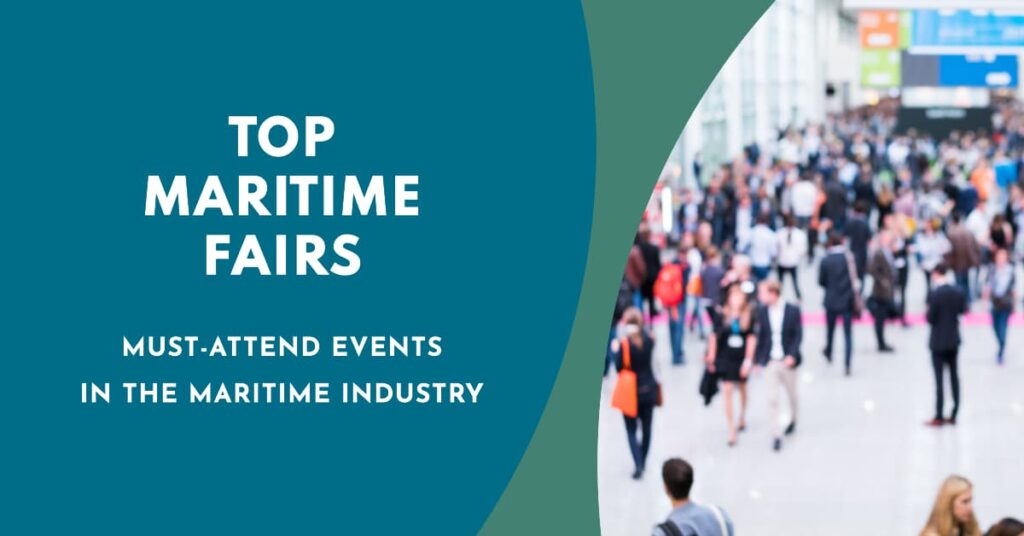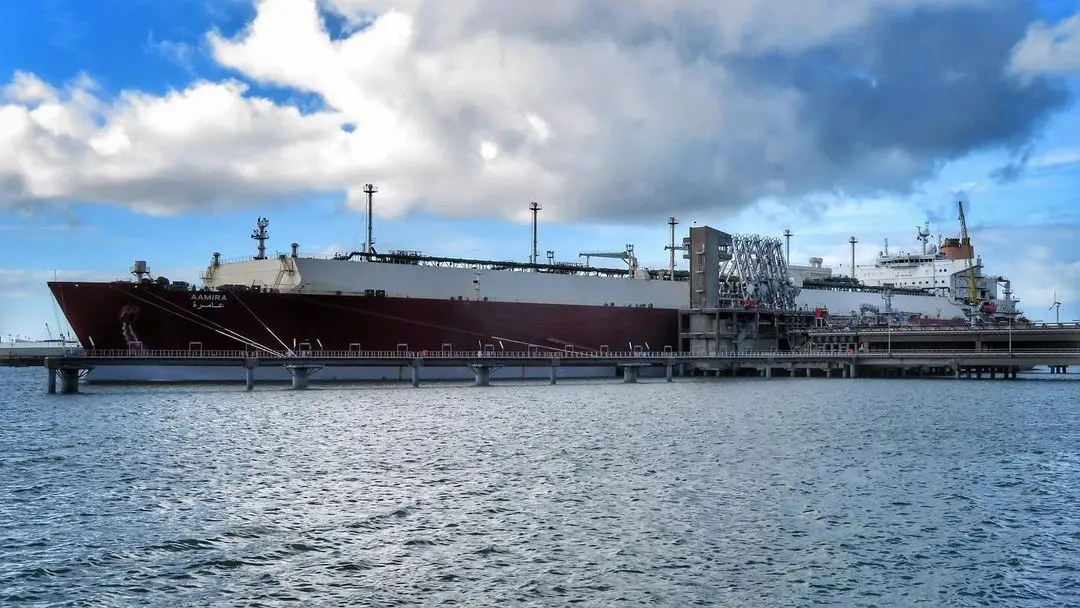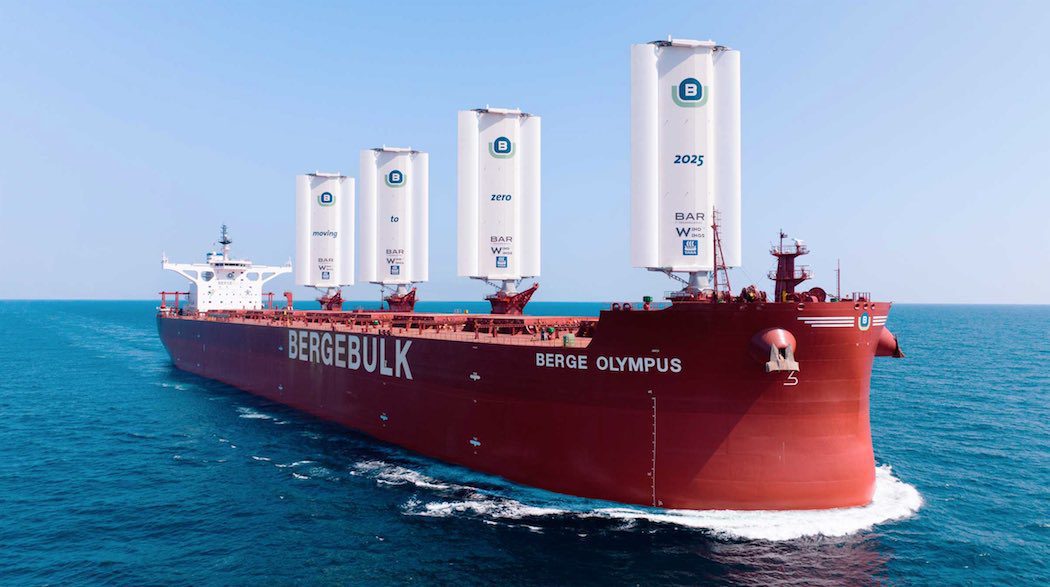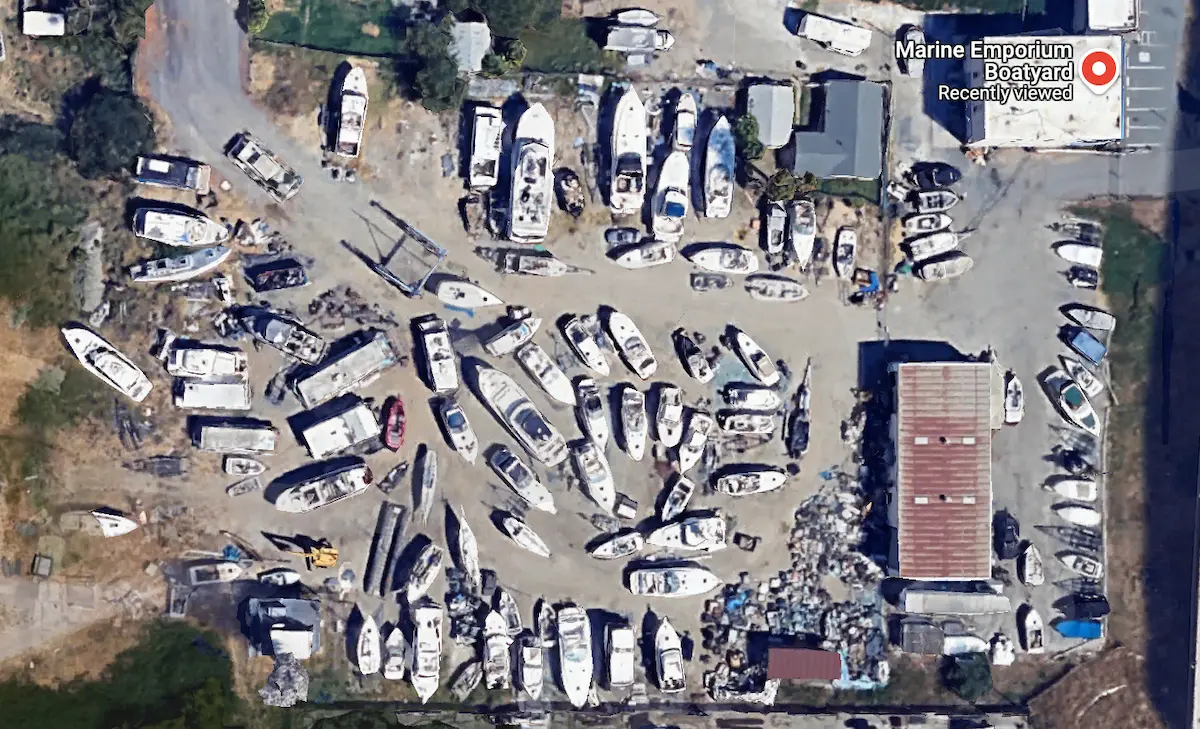Maritime fairs are some of the most important events in the world’s shipping industry. These events bring together key participants in the maritime industry to showcase the latest technological innovations, trends, and developments.
From shipbuilding to logistics, and transportation to port operations, maritime fairs provide a platform for businesses to connect, network, and explore new opportunities.
Global maritime fairs attract participants from all over the world, making them truly international events. Some of the most well-known maritime fairs include SMM in Hamburg, Nor-Shipping in Oslo, and Posidonia in Athens.

These fairs are attended by thousands of professionals from the maritime industry, including shipowners, shipbuilders, port operators, and logistics providers.
In recent years, maritime fairs have become increasingly focused on innovative technology and trends in the industry. From autonomous shipping to digitalization, these events provide a glimpse into the future of the maritime industry.
Maritime fairs also have a significant impact on the industry, influencing business decisions, investment strategies, and technological development. As such, they are an important part of the global maritime industry and will continue to shape its future.
Key Takeaways
- Maritime fairs provide a platform for businesses to connect, network, and explore new opportunities in the industry.
- Global maritime fairs attract participants from all over the world and are increasingly focused on innovative technology and trends.
- Maritime fairs have a significant impact on the industry, influencing business decisions, investment strategies, and technological development.
Global Maritime Fairs
The maritime industry is a global industry, and there are many fairs and exhibitions held around the world that showcase the latest products, technologies, and services in the industry. Here are some of the most prominent maritime fairs held around the world.
Asia’s Prominent Fairs
Marintec China is one of the largest and most influential maritime events in Asia, attracting thousands of exhibitors and visitors from around the world.
It is held every two years in Shanghai, China, and features a wide range of products and services related to shipbuilding, marine engineering, offshore engineering, and more.
The Indonesia Maritime Expo is another important event in Asia, providing a platform for companies to showcase their latest products and services to a global audience. It is held annually in Jakarta, Indonesia, and attracts exhibitors and visitors from around the world.
Europe’s Key Events
Europort is one of the leading maritime fairs in Europe, held biennially in Rotterdam, Netherlands. It features a wide range of products and services related to shipbuilding, offshore, and dredging industries, and attracts exhibitors and visitors from around the world.
Nor-Shipping is another important event in Europe, held biennially in Oslo, Norway. It is a leading maritime event that brings together key players in the industry to discuss the latest trends and innovations in the maritime sector.
Africa’s Notable Expositions
OTL Africa Downstream Week is one of the most important events in Africa’s maritime industry, providing a platform for companies to showcase their latest products and services to a global audience. It is held annually in Lagos, Nigeria, and attracts exhibitors and visitors from around the world.
North America’s Significant Fairs
Vancouver Travel and Wedding Expo is one of the most important events in North America’s maritime industry, providing a platform for companies to showcase their latest products and services related to the travel and wedding industries.
It is held annually in Vancouver, Canada, and attracts exhibitors and visitors from around the world.
Other Notable Fairs
SMM is one of the most important maritime fairs in the world, held biennially in Hamburg, Germany. It is a leading international maritime trade fair that brings together key players in the industry to discuss the latest trends and innovations in the maritime sector.
Posidonia is another important event in the maritime industry, held biennially in Athens, Greece. It is one of the largest international shipping exhibitions in the world, attracting exhibitors and visitors from around the world.
Inmex SMM India is one of the largest maritime fairs in India, held annually in Mumbai. It provides a platform for companies to showcase their latest products and services related to the maritime industry.
Expomaritt Exposhipping Istanbul is one of the most important maritime fairs in Turkey, held biennially in Istanbul. It features a wide range of products and services related to the maritime industry, and attracts exhibitors and visitors from around the world.
Bangladesh International Marine and Offshore Expo is an important event in Bangladesh’s maritime industry, providing a platform for companies to showcase their latest products and services to a global audience.
Baltexpo is one of the most important maritime fairs in the Baltic Sea region, held biennially in Gdansk, Poland. It features a wide range of products and services related to the maritime industry, and attracts exhibitors and visitors from around the world.
Key Participants in Maritime Fairs
Maritime fairs bring together key participants from all sectors of the industry. These trade shows offer a unique opportunity for networking, learning about new technologies, and showcasing products and services. The following are the main categories of participants at maritime fairs:
Exhibitors and Service Providers
Exhibitors and service providers are the backbone of maritime fairs. They are the companies that showcase their products and services to potential customers and partners.
Exhibitors can include shipbuilders, equipment manufacturers, logistics companies, and technology providers. Service providers can include classification societies, insurance companies, and financial institutions.
Exhibitors and service providers use maritime fairs to launch new products, meet with customers, and generate leads. They also use these events to learn about new trends and technologies in the industry.
Government and Regulatory Bodies
Government and regulatory bodies play an important role in the maritime industry. They are responsible for setting regulations and standards that affect the industry. They also provide support for companies in the industry, such as funding for research and development.
Government and regulatory bodies can include national and local governments, as well as international organizations such as the International Maritime Organization (IMO). These entities use maritime fairs to promote their services and initiatives, as well as to meet with industry stakeholders.
Maritime Professionals and Speakers
Maritime professionals and speakers are another important group of participants at maritime fairs. These can include shipowners, operators, engineers, and other industry professionals. Speakers can include experts in various fields, such as sustainability, digitalization, and safety.
Maritime professionals and speakers use maritime fairs to network with colleagues, learn about new developments in the industry, and share their own expertise. They also use these events to participate in panel discussions and other educational sessions.
Overall, maritime fairs bring together a diverse group of participants from all sectors of the industry. Exhibitors and service providers showcase their products and services, while government and regulatory bodies promote their initiatives.
Maritime professionals and speakers share their expertise and learn about new developments in the industry. These events are a key platform for initiating and expanding business relationships and dialogue on current topics in the maritime industry.
Innovations and Trends in Maritime Industry
The maritime industry has been witnessing significant changes in recent years, with the adoption of innovative technologies and trends that are transforming the way the industry operates.
This section will explore some of the latest trends and innovations in the maritime industry, focusing on technology and machinery, environment and security, and logistics and supply chain.
Technology and Machinery
The maritime industry has been embracing innovative technologies to improve efficiency, safety, and sustainability. One of the most significant trends in this area is the use of automation and robotics to optimize operations and reduce costs.
Autonomous vessels, for example, are being developed to revolutionize the shipping industry by reducing the need for human intervention and improving safety.
Another area of innovation is the use of big data and analytics to optimize vessel performance and reduce fuel consumption. By analyzing data from sensors and other sources, operators can identify areas for improvement and make informed decisions to reduce costs and emissions.
Environment and Security
The maritime industry is also focused on improving environmental sustainability and security. One of the most significant trends in this area is the adoption of green technologies, such as alternative fuels and energy-efficient systems.
The use of renewable energy sources, such as wind and solar power, is also gaining traction.
Another area of focus is security, with the industry adopting innovative technologies to improve safety and prevent piracy and other security threats. Advanced surveillance systems, for example, are being developed to monitor vessels and detect potential security risks.
Logistics and Supply Chain
The maritime industry is also seeing significant changes in logistics and supply chain management. The adoption of digitalization and automation is transforming the way goods are transported, with the use of blockchain technology and other digital platforms to improve transparency and efficiency.
One of the most significant trends in this area is the adoption of smart ports, which use advanced technologies to optimize operations and improve efficiency. This includes the use of autonomous cranes, drones, and other technologies to streamline operations and reduce costs.
In conclusion, the maritime industry is witnessing significant changes and innovations, with a focus on technology, sustainability, and efficiency. By embracing these trends, the industry can improve operations, reduce costs, and become more sustainable and secure.
Impact of Maritime Fairs
Maritime fairs play a crucial role in the business world, particularly in the transportation and logistics sectors. These fairs provide a platform for businesses to showcase their products and services, network with potential clients and partners, and stay up-to-date with the latest trends and technologies in the industry.
The impact of maritime fairs extends beyond just the businesses and attendees, as they also contribute to the overall value chain of the industry.
For example, these fairs provide opportunities for suppliers to showcase their products to manufacturers, who can then incorporate these products into their vessels and equipment. This helps to improve the quality of the vessels and equipment, which ultimately benefits the end-users of these products and services.
In addition to the direct impact on the industry value chain, maritime fairs also have a positive impact on the local economies where they are held.
These events attract a large number of attendees from around the world, who spend money on transportation, accommodation, food, and other local services. This creates jobs and generates revenue for the local businesses, which helps to boost the overall economy.
Overall, the impact of maritime fairs is significant and far-reaching. They provide a platform for businesses to connect and collaborate, contribute to the value chain of the industry, and support the local economies where they are held. As such, they play a critical role in the growth and development of the maritime industry.
Future of Maritime Fairs
Maritime fairs have been an integral part of the industry for decades, providing a platform for businesses to showcase their products, network with industry leaders, and keep up with the latest trends and innovations.
As technology continues to advance and the industry evolves, the future of maritime fairs is likely to change as well.
One trend that is likely to shape the future of maritime fairs is the increased focus on sustainability. As the industry works to reduce its carbon footprint and become more environmentally friendly, maritime fairs are likely to showcase more sustainable products and technologies. This could include everything from cleaner-burning engines to more efficient shipping routes and logistics systems.
Another trend that is likely to impact maritime fairs is the growing use of innovative technology. From autonomous ships to blockchain-based supply chain management systems, there are a wide range of technologies that are transforming the industry.
Maritime fairs are likely to showcase these technologies, providing businesses with an opportunity to see them in action and learn how they can be integrated into their operations.
In addition to these trends, the future of maritime fairs is likely to be shaped by the ongoing innovation that is taking place within the industry.
From new materials and manufacturing techniques to more efficient cargo handling systems, there are a wide range of innovations that are driving the industry forward. Maritime fairs will continue to be a key platform for showcasing these innovations and helping businesses stay ahead of the curve.
Overall, the future of maritime fairs is likely to be shaped by a combination of trends, innovation, and innovative technology. As the industry continues to evolve, these fairs will remain a vital part of the ecosystem, providing businesses with a platform to showcase their products, network with industry leaders, and stay up-to-date with the latest developments.
Frequently Asked Questions
What are the upcoming maritime technology events in 2023?
There are several upcoming maritime technology events in 2023 that are worth attending. Some of the most notable ones include the Smart Maritime Network Conference, the International Conference on Maritime Autonomous Surface Ships, and the Marine Equipment Trade Show (METS). These events will showcase the latest advancements and trends in the maritime industry.
What are the top marine events to attend in 2023?
The top marine events to attend in 2023 include the Nor-Shipping trade fair, the SMM Hamburg, and the World Maritime Day Parallel Event. These events attract industry professionals from all over the world and provide a platform for networking, learning, and showcasing new products and services.
What is the biggest international shipping week?
The biggest international shipping week is London International Shipping Week (LISW). This event takes place every two years and brings together key players from the international shipping industry. It includes a range of conferences, seminars, and social events, and provides an opportunity for industry professionals to discuss the latest trends and developments in the sector.
What are the most popular port trade shows?
Some of the most popular port trade shows include TOC Europe, Intermodal Europe, and Breakbulk Europe. These events focus on the logistics and transportation aspects of the maritime industry and provide a platform for companies to showcase their products and services to a global audience.
What are the latest developments in marine technology?
The latest developments in marine technology include the use of artificial intelligence, autonomous vessels, and digitalization. These technologies are transforming the way the maritime industry operates and are helping to increase efficiency, reduce costs, and improve safety.
What are the top conferences for the shipping industry in 2023?
The top conferences for the shipping industry in 2023 include the Global Maritime Forum Annual Summit, the International Shipping Week, and the Seatrade Maritime Middle East. These events provide an opportunity for industry professionals to network, learn, and discuss the latest trends and developments in the sector.
- Types of Gas Carriers as per IGC Code – April 22, 2025
- Wind-Assisted Propulsion Systems (WAPS): A Game Changer for Maritime Decarbonization – February 6, 2025
- 10 Boat Salvage Yards in California – January 25, 2025



